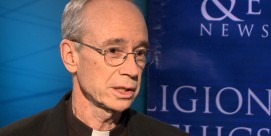In This Episode << SLIDE LEFT TO SEE ADDITIONAL SEGMENTS
Wendy Zoba on Billy Graham
Read more of Kim Lawton’s interview about Billy Graham with journalist and author Wendy Murray Zoba, writer-in-residence at Gordon College in Wenham, Massachusetts:
How meaningful is it to see this giant of evangelical Christianity still going strong at age 86, still doing these crusades that he’s been doing for almost 60 years?
Billy Graham is doing a remarkable thing, going back into the pulpit at this stage of his career. He’s aging, as we all know, and there is some bittersweet aspect to watching this one-time towering giant more enfeebled. His message is still as robust as always, but it’s very obvious that his physical disposition and state is much diminished from the young man who used to prance around on stage and wave his finger and wave his Bible.
Evangelicalism is at a very critical juncture right now. Billy Graham is one of the towering figures that forged a new definition of what evangelicalism is. That definition is changing even so. Perhaps his presence can lend a sense of stability not only to those who consider themselves evangelicals but also to those who are outside that community and are questioning and, in some cases, feeling some fear about the presence of evangelicals on the cultural landscape. So this is a very timely crusade. I’m not quite sure how people will respond to seeing an older man who’s struggling on so many levels in a physical way. As I said, it could be very poignant, bittersweet. But we all love Billy Graham. He’s an institution, not just for the evangelical community but for all of us as a nation. We kind of look to him as our nation’s pastor, in a way.
Speaking of changing views and definitions, there was a time when he created fear in some quarters because of his preaching in the early days. How has he himself evolved?
He did start out with a very flamboyant, zealous, kind of in-your-face approach. It didn’t take long to mellow him. For one thing, he’s married to Ruth Bell Graham, and she kind of let him know when he was doing a little too much prancing around up there. Billy Graham is a man with a very clear vision and a very decisive direction in terms of what he wants to say and how he wants to say it. He did start out with the white shoes and the fancy pants and all of that and did kind of evoke some strange reactions from people. But he quickly understood his role in a more circumspect way. He mellowed his approach to his public persona, and he truly became a unifier. He’s very much wanting to break down walls, did break down walls and, at the same time, forged a new definition of what it means to be a believing person who trusts in the authority of the Bible without necessarily having to abdicate character and having to abdicate intellectualism and abdicate a sound and gracious spirit. Billy Graham has encapsulated all of that, and he has evolved as a preacher, but his message has stayed the same. He’s learned some hard lessons in terms of the way he might relate to those, for example, in the political sphere. He has been friends with many presidents through many terms and has adapted accordingly. He made a little bit of a mistake in the coziness he reached with Richard Nixon, but he learned from that, and he’s very malleable in that way and that evokes, I think, a sense of confidence in people. They trust him.
Was it his style that changed and mellowed, or his beliefs, or just how he was portraying and speaking about those beliefs?
His style mellowed over the years. He was quite animated at the beginning. It’s the zealousness of youth, I believe. He recognized his gift as a young man and immediately started to exercise it. It started to be off-putting in some ways, the way that he would wave his Bible around. And his wife enabled him to understand that he would serve the ministry and serve himself to slow down and to be more measured and more mellow in the way that he gave his presentation.
His message hasn’t changed. That’s the wonderful thing about Billy Graham. It’s as clear as poetry, and it is a kind of poetry. And his spirit has only expanded and become more gracious, and he’s willing to invite anyone to have a discussion or conversation with him. No one feels threatened doing so with him because his spirit has always been very gracious and unifying. So whereas his presentation has mellowed and matured, which is really the natural course for any ministry leader, his message has remained largely the same. It’s very clear, it’s very simple, and it’s very to the point, and he delivers it in a way that people can receive. Not everyone believes it but, in any case, people can receive it in large part because they trust the integrity of the man behind the message.
Where does Billy Graham fit into the changing definitions of evangelicalism?
Billy Graham took the movement to where it is today. Billy Graham is one of the shapers of the evangelical movement as we know it today, although evangelicalism as it is currently being perceived and understood is a different kind of evangelicalism than Billy Graham himself was shaping. He came of age during the time when there was a lot of uncertainty on the cultural and religious landscape about the place of the Bible and the role of Bible-believing Christians. Billy Graham, along with other strong and visionary leaders of his generation, felt it was very important that Christians who believed in the authority of the Bible continue to engage culture, continue to be part of the landscape and the cultural conversation. This is where he and several other leaders of that era — I’m thinking of the 1940s and the 1950s — seized upon the opportunity to take the message forward in a new and dynamic way.
Evangelicalism as we know it today was, at its insemination in the mid-twentieth century, very much a forward-looking and culturally engaged and intellectually hungry kind of expression of belief in Scripture and belief in the gospel narrative. Billy Graham gave that definition. He gave that — a person people could look to as, for lack of a better way of putting it, “The Answer Man” for the questions people might have about this kind of thing. While on the one hand his message was very clear and very simple, on the other hand Billy Graham was very sophisticated and, in some ways, very savvy in his approach to ministry and public presentation of a very profound theological narrative. He brought people together. He was very much a part of the shaping of institutions that today remain leading institutions in evangelicalism, and he always wanted the movement to be culturally engaged.
That has brought us today to a place that probably at that time Billy Graham wasn’t anticipating. Evangelicalism has become so culturally engaged that many outside the movement and outside the believing community are beginning to feel threatened by the presence of this subgroup and their political action and some of the positions they’re taking on cultural matters, and it’s becoming divisive. That’s something Billy Graham never would want, and I know that if he had the strength and the ability, he would also be trying to redress that and continue his unifying ministry. But we’re going to have to look for new leadership for that.
Will the era of the big crusade and that message that he so popularized also go with him?
He seized upon the same model of Charles Finney in the Second Great Awakening, the crusade model, where the opportunity for people to make a confession of faith was staged, was orchestrated. Music prepared the spirit; the “waiting benches,” as they were called, were filled with people who had been prompted ahead of time to start the flow. It’s a very staged event, but that in no way diminishes the authenticity of those who make confessions of faith and whose lives are changed at these crusades. I can’t anticipate whether the crusade model is going to continue to be viable. Obviously, people come together in these large, massive crowds and respond very emotively. That’s evident in secular rock concerts and that kind of thing. Whether that’s the venue where people will have an experience with an authentic faith moment in their lives is yet to be determined. We’re dealing with a different landscape of belief; we’re dealing with a different generation; we’re dealing with a different place in our world’s history, and the believing community has to be flexible enough to perceive that and not try to put new wine into old wineskins. The age in which we live is demanding adaptation, and the evangelical community has to be elastic, has to be flexible, has to be willing to make some adaptations and some changes and find new ways of being relevant. In many ways, if we cleave to those old models, the movement will become irrelevant and will not touch the hearts of a seeking public [that], I think, really does hunger for some solid answers relating to who God is and if there is a God.
Billy Graham certainly adapted his crusade model, bringing in rock groups, media, all sorts of other experiences.
He did. He was very dynamic in that way, and it served its purpose. But I know for a fact that bringing in CCM — Contemporary Christian Music — and ramping up the noise level or the sound level of a crusade isn’t necessarily going to penetrate the depths of the hungering souls that are looking for answers. It might. But the trappings of the crusade aren’t going to be sufficient to carry this next generation into a place of belief. There have to be solid, authentic, interactive questions and answers about who God is and the kind of world we’re living in and where God fits in and what does it mean. Who is Jesus? What does it mean to follow Jesus? Formulas and platitudes and pat answers do not work for this day and age, and that’s very much part and parcel of the package of the crusade event. So there has to be some flexibility within the community as we face this new century, this new millennium, and the age in which we live.
What has he meant to you and others?
Billy Graham is the man of the moment, the man of twentieth-century evangelicalism. I can’t number the people who, in the course of my career as a journalist, have said to me, “Oh, I heard Billy Graham on the radio,” or “I saw Billy Graham at a crusade.” Billy Graham’s name comes up all the time. Billy Graham was very seminal in my own spiritual evolution. He was the man of our century in terms of defining what it means to be a Bible-believing Christian in a way that’s respectable and honorable, and we all owe him a great debt of gratitude.
You mentioned he has been the nation’s pastor. What has he meant to the nation as a whole?
Billy Graham was present at our nation’s critical moments. He was present when 9/11 happened. When presidents die, when presidents take office, Billy Graham is there. He became an institution, and a comforting kind of institution. It’s the integrity of the man behind the message that people resonated with, even people outside the camp that would be called evangelicals. He won people’s hearts because he was a unifier. He was authentic. He was a man we could trust. Especially today, people are so jaded about evangelicalism, and with some reason. Many leaders who have asserted themselves into public positions have proven themselves to be duplicitous. Therefore, to find someone who is solid as a rock the way Billy Graham has been — by no means perfect, by no means perfect, but he has been solid, and he has been true, and he has been unafraid. And that has won the confidence of the mainstream culture. People who believe in his message and people who might be dubious about his message nevertheless trust Billy Graham and take no offense that he is present at the critical moments of our nation’s various passages.







